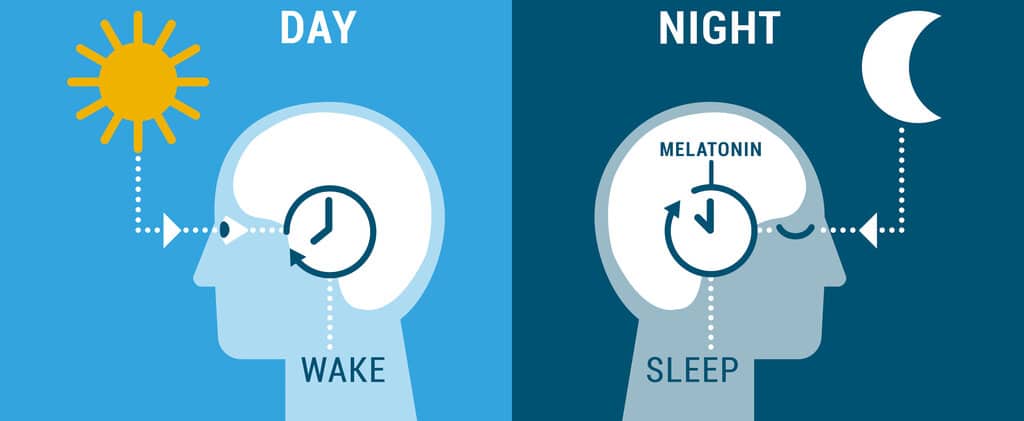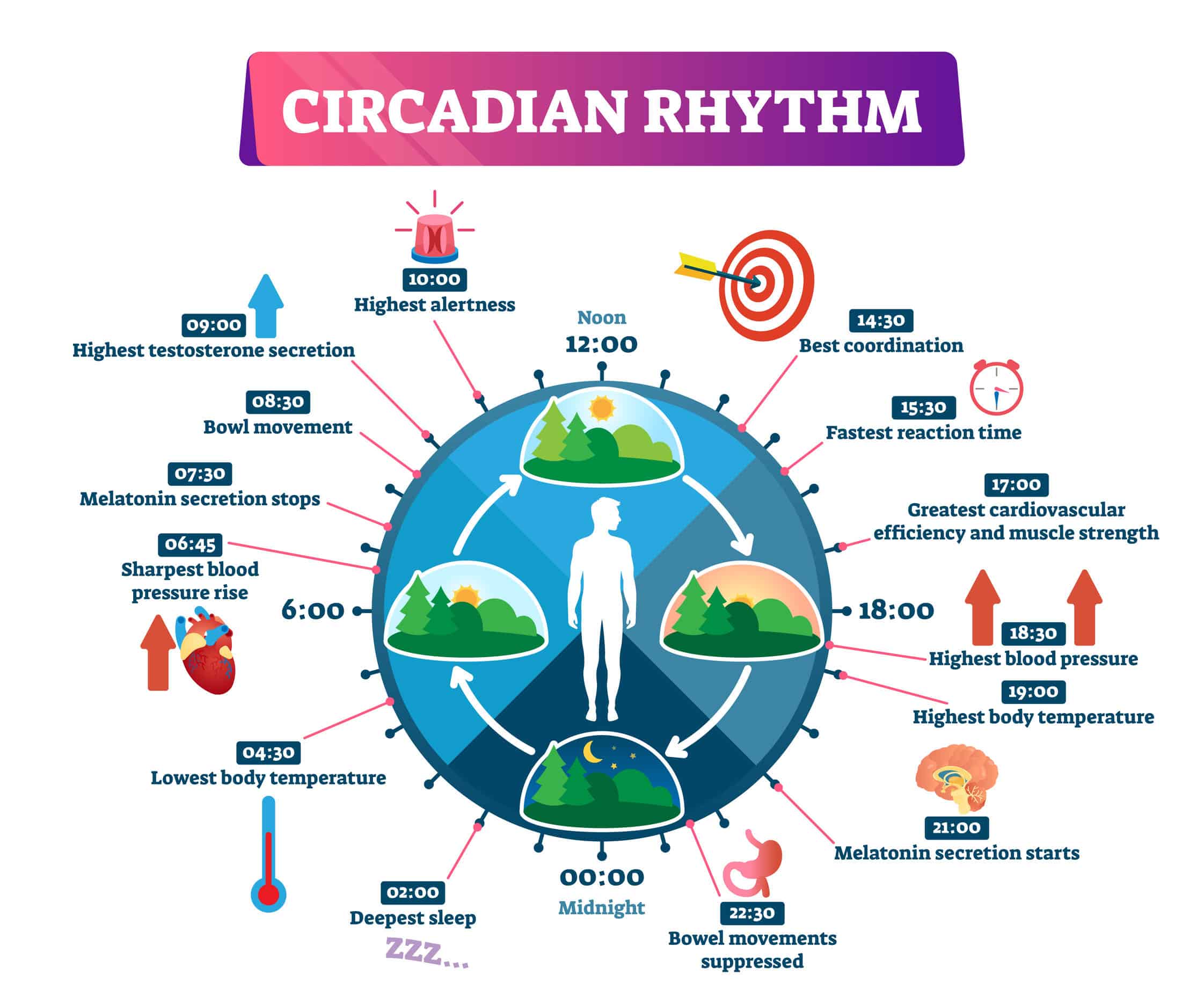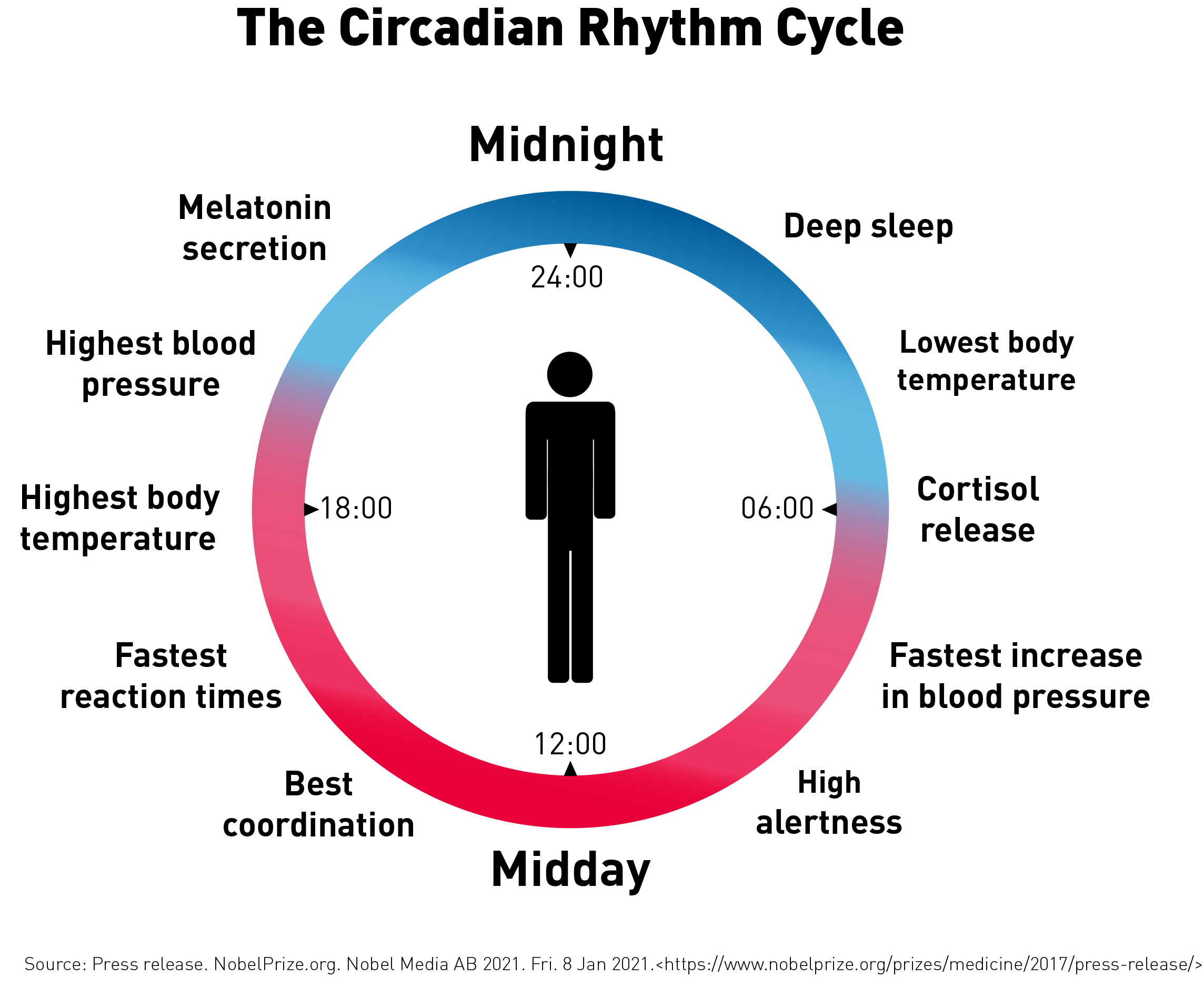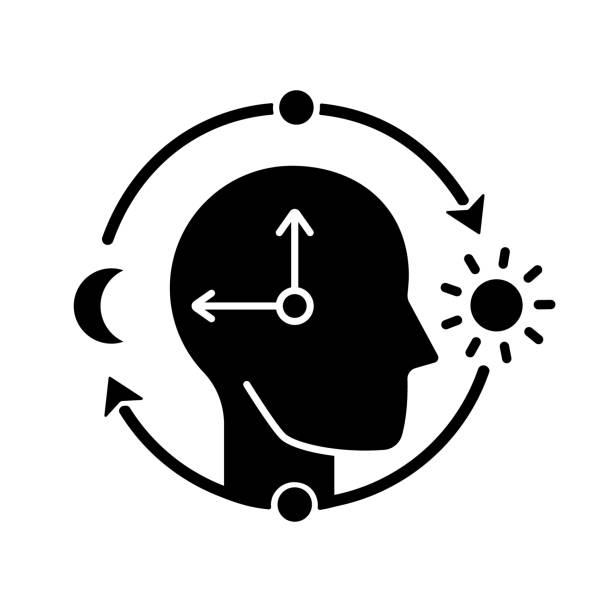The Biological Clock: Understanding the Circadian Rhythm The human body is an intricate system that is controlled by various biological processes. One such process that affects our daily life is the circadian rhythm. This term refers to the internal “body clock” that regulates our sleep-wake cycle, metabolism, and other bodily functions on a 24-hour basis.
Disruptions to this natural rhythm can lead to health problems such as insomnia, fatigue, and depression. Understanding the circadian rhythm can help us maintain a healthy lifestyle by optimizing our sleep patterns and improving our overall well-being.
In this article, we will delve deeper into what the circadian rhythm entails and how it affects our lives. We will also discuss strategies for maintaining a healthy sleep schedule and ways to optimize your daily routine based on your unique internal clock. Let’s explore everything you need to know about the circadian rhythm.
Are you a morning person or a night owl? Have you ever wondered why your body naturally wakes up at the same time every day, without an alarm clock? The answer lies in our circadian rhythm, the internal biological clock that regulates our sleep-wake cycle, and many other bodily functions.
In this article, we will explore what circadian rhythms are, how they work, and the impact they have on our daily lives. From sleep patterns to mood swings, circadian rhythms play a crucial role in our physical and mental well-being. So buckle up and let’s dive into the fascinating world of circadian rhythm!

Key Takeaways:
- Circadian rhythm is the internal biological clock that regulates our sleep-wake cycle and various other bodily functions.
- Maintaining a regular sleep schedule that aligns with our circadian rhythm can improve the quality of our sleep and help us feel more refreshed during the day.
- Disruptions to our circadian rhythm, such as jet lag or shift work, can cause sleep disturbances and affect overall health.
Circadian Rhythm
Circadian rhythm is the internal biological clock that regulates our sleep-wake cycle and various other bodily functions. It is shaped by environmental cues such as light and temperature, along with genetic factors. Our circadian rhythm influences when we feel alert or drowsy, as well as our body temperature, hormone levels, and metabolism.
Maintaining a regular sleep schedule that aligns with our circadian rhythm can improve the quality of our sleep and help us feel more refreshed during the day. Disruptions to our circadian rhythm, such as jet lag or shift work, can cause sleep disturbances and affect overall health.
Therefore, it’s essential to pay attention to our body’s natural rhythms and establish healthy sleep habits that support them. By doing so, we can optimize our physical and mental well-being and lead more fulfilling life.
What Are Circadian Rhythms?
Circadian rhythms are the internal biological clock that regulates our sleep-wake cycle and other bodily functions. These 24-hour cycles are shaped by environmental cues such as light and temperature, as well as genetic factors. Our circadian rhythm influences when we feel alert or drowsy, along with our body temperature, hormone levels, and metabolism.
Maintaining a regular sleep schedule that aligns with our circadian rhythm can improve the quality of our sleep and help us feel more refreshed during the day. Disruptions to our circadian rhythm, such as jet lag or shift work, can cause sleep disturbances and affect overall health.
It’s essential to pay attention to our body’s natural rhythms and establish healthy sleep habits that support them. By doing so, we can optimize our physical and mental well-being and lead more fulfilling life. Understanding circadian rhythms is an important step in achieving restorative sleep and maintaining overall health.
So, listen to your body and embrace your natural circadian rhythm for a happier, healthier life!
In the next section, we’ll dive deeper into understanding how our circadian rhythm works and what factors can disrupt it.
How Does Circadian Rhythm Work?
Circadian rhythms are the internal biological clock that regulates our sleep-wake cycle and other bodily functions. These 24-hour cycles are shaped by environmental cues such as light and temperature, as well as genetic factors. Our circadian rhythm influences when we feel alert or drowsy, along with our body temperature, hormone levels, and metabolism.
The circadian rhythm is controlled by a group of cells in the brain’s hypothalamus called the suprachiasmatic nucleus (SCN). The SCN receives information about light from the eyes and uses this information to synchronize with the external environment. This synchronization helps to regulate sleep patterns, hormone production, digestion, and other bodily functions.
Factors such as jet lag or shift work can disrupt our circadian rhythm by throwing off our sleep schedule and disrupting our body’s internal clock. This disruption can cause sleep disturbances, fatigue, mood changes, and other health problems.
Maintaining a regular sleep schedule that aligns with our circadian rhythm is essential for optimal physical and mental well-being. By paying attention to our body’s natural rhythms and establishing healthy sleep habits that support them, we can improve the quality of our sleep and lead a more fulfilling life. Understanding how circadian rhythms work is an important step in achieving restorative sleep and maintaining overall health.
In essence, our circadian rhythm is like an internal conductor that orchestrates the symphony of bodily functions, and keeping it in harmony is crucial for a healthy and happy life.
But what exactly is the difference between a circadian rhythm and a biological clock? Let’s take a closer look.
See also: Choosing Size Matters: California King vs King Mattress Comparison (2023)
Is a Circadian Rhythm the Same As a Biological Clock?
While a circadian rhythm is a type of biological clock, not all biological clocks are circadian. Biological clocks are internal mechanisms that regulate the timing of bodily processes, including sleep-wake cycles, hormone production, and metabolism. These clocks can be influenced by environmental cues such as light and temperature, as well as genetic factors.
Circadian rhythms are specifically 24-hour cycles that are controlled by cells in the brain’s hypothalamus called the suprachiasmatic nucleus (SCN). The SCN receives information about light from the eyes and uses this information to synchronize with the external environment. This synchronization helps to regulate sleep patterns, hormone production, digestion, and other bodily functions.
Other types of biological clocks include ultradian rhythms (cycles shorter than 24 hours) and infradian rhythms (cycles longer than 24 hours). For instance, plants use a biological clock with timing that is distinct from a 24-hour cycle to adjust to changing seasons.
In summary, while a circadian rhythm is one type of biological clock that regulates our sleep-wake cycle and other bodily functions on a 24-hour basis, there are other types of biological clocks with different timing mechanisms.
See also
How Does Circadian Rhythm Affect Sleep?
Circadian rhythm plays a crucial role in regulating our sleep-wake cycle. Our bodies have an internal clock that is synchronized with the external environment, primarily through exposure to light. This synchronization helps our bodies determine when it’s time to be awake and alert and when it’s time to rest.
When we are exposed to light during the day, the master clock in our brain sends signals that generate alertness and help keep us awake. As night falls, the production of melatonin increases, which makes us feel sleepy and prepares us for restorative sleep. Without this synchronization between our internal clock and the external environment, our sleep patterns can become disrupted, leading to difficulties falling asleep or staying asleep.
Disruptions in circadian rhythm can also affect other bodily functions such as hormone production, digestion, and metabolism. Shift work, jet lag, and other disruptions to regular sleep schedules can cause imbalances in circadian rhythm that may lead to health issues over time.
Therefore, it’s essential to maintain a consistent sleep schedule and prioritize good sleep hygiene habits such as avoiding electronic devices before bed and creating a relaxing bedtime routine. By prioritizing healthy sleep habits that support circadian rhythm alignment with the external environment, we can optimize our restorative rest and daytime activity levels.
In conclusion, our circadian rhythm is a delicate balance between our internal clock and the external environment that plays a crucial role in regulating our sleep-wake cycle and overall health.
Teaser: But how exactly does this internal clock work, and what factors can disrupt it?
Check out more about Why Is Sleep Important to Weight Loss?
How Circadian Rhythms Work
Circadian rhythms are the natural, 24-hour cycles that regulate our sleep-wake cycle and other bodily functions. The suprachiasmatic nucleus, a part of our brain’s hypothalamus, controls these rhythms through about 20,000 nerve cells that make up our “master clock.” This internal clock is largely guided by our genes and natural factors inside our bodies but can also be influenced by external cues, with light being the most significant.
When we’re exposed to light during the day, it activates signals from the master clock that generate alertness and keep us awake. As night falls, melatonin production increases, making us feel sleepy and preparing us for restorative sleep. Disruptions to this synchronization between our internal clock and the external environment can lead to difficulties falling asleep or staying asleep.
Factors such as shift work or jet lag can cause imbalances in circadian rhythm that may lead to health issues over time. Therefore, it’s crucial to maintain consistent sleep schedules and prioritize good sleep hygiene habits like avoiding electronic devices before bed. By supporting circadian rhythm alignment with the external environment, we can optimize our restorative rest and daytime activity levels.
In conclusion, paying attention to our internal clock and working with our natural circadian rhythms can lead to better sleep and overall health. And speaking of different patterns, did you know that there are unique sleep patterns for different people based on their age and lifestyle?
Can Electronics Affect Quality Sleep?

Different Patterns for Different People
Sleep patterns can vary based on many factors, including age and lifestyle. Infants and young children require more sleep than adults, with newborns sleeping up to 17 hours a day. Teenagers may require more sleep due to their growth and development, while older adults may experience changes in their sleep patterns due to hormonal shifts or medical conditions.
Additionally, our lifestyles can impact our sleep patterns. Individuals who work night shifts may struggle to maintain a consistent sleep schedule and may experience disruptions in their circadian rhythm. Athletes may need more sleep to support their physical recovery, while individuals with high-stress jobs may have difficulty falling asleep due to heightened levels of anxiety.
It’s important for individuals to pay attention to their own unique sleep needs and adjust their routines accordingly. This may include establishing consistent bedtime routines, creating a comfortable sleep environment, and avoiding electronic devices before bed.
By prioritizing good sleep hygiene habits and working with our natural sleep patterns, we can optimize our restorative rest and improve overall health and well-being.
So, whether you’re a night owl or an early bird, remember that the secret to a good night’s sleep lies in understanding your unique sleep patterns and taking steps to support them. And speaking of sleep patterns, have you ever wondered how circadian rhythms can get out of sync? Keep reading to find out more.
Circadian Rhythms Out of Sync
Circadian rhythms are our body’s internal clock that helps regulate sleep-wake cycles, hormone production, and other physiological processes. However, various factors can disrupt these rhythms, leading to sleep problems and other health issues.
One common cause of circadian rhythm disruptions is jet lag or shift work. When we travel across multiple time zones or work during nighttime hours, our bodies struggle to adjust to the new schedule, resulting in fatigue and insomnia.
Other factors that can throw off our circadian rhythms include irregular sleep schedules, exposure to bright lights at night, and the use of electronic devices before bedtime. These disruptions can lead to a host of negative effects on our physical and mental health, including increased risk of obesity, diabetes, depression, and heart disease.
To maintain a healthy circadian rhythm, it’s important to establish consistent sleep patterns by going to bed and waking up at the same time every day. Additionally, avoiding bright lights before bedtime can help signal your body that it’s time for rest. By prioritizing good sleep hygiene habits and working with our natural sleep patterns, we can optimize our restorative rest and improve overall health and well-being.
Incorporating healthy sleep habits can positively impact our circadian rhythm and overall health, so let’s prioritize our best to live our best lives.
But did you know that circadian rhythm affects more than just sleep?
What Does Circadian Rhythm Affect Besides Sleep?
While the sleep-wake cycle is the most well-known circadian rhythm, it’s important to know that these 24-hour internal clocks impact many systems of the body. Research has connected circadian rhythms to metabolism and weight regulation through the control of blood sugar and cholesterol levels. Mental health is also influenced by circadian rhythms, with disruptions potentially increasing the risk of psychiatric illnesses such as depression.
There are indications that circadian rhythms play a critical role in the immune system and processes related to DNA repair, which are crucial in preventing cancer. Additionally, early research suggests that circadian cycles can impact the effectiveness of anti-cancer drugs.
Disruptions to our body’s internal clock can come from various sources, including jet lag or shift work, irregular sleep schedules, exposure to bright lights at night, and using electronic devices before bedtime. Prioritizing good sleep hygiene habits and working with our natural sleep patterns can help optimize our restorative rest and improve overall health and well-being beyond just getting enough sleep.
As we continue to unravel the mysteries of circadian rhythms, it becomes clear that they impact far more than just our sleep. By prioritizing our body’s natural clock and taking steps to maintain its regularity, we can improve our physical and mental health in countless ways. But what happens when our circadian rhythm is off? Let’s explore.
What Happens When Circadian Rhythm Is Off?
When the body’s internal clock, or circadian rhythm, is thrown off, it can negatively impact many systems of the body beyond just sleep. Disruptions to this 24-hour cycle can increase the risk of metabolic disorders such as diabetes and obesity by affecting blood sugar and cholesterol levels. Mental health may also be affected, with disrupted circadian rhythms potentially contributing to depression and other psychiatric illnesses.
Additionally, research indicates that circadian rhythms play a crucial role in the immune system and DNA repair processes that help prevent cancer. Early studies also suggest that anti-cancer drugs may be less effective when administered at certain times due to variations in circadian cycles.
Disruptions to the body’s natural clock can stem from various sources, including irregular sleep schedules, exposure to bright lights at night, and using electronic devices before bedtime. Prioritizing good sleep hygiene habits and working with our natural sleep patterns can help optimize our restorative rest and improve overall health and well-being.
In summary, a misaligned circadian rhythm can negatively affect numerous aspects of our health beyond just sleeping problems. Maintaining regularity in our internal clock through healthy habits is essential for promoting optimal physical and mental wellness.
In conclusion, our internal clock plays a vital role in maintaining overall health and wellness, beyond just getting a good night’s sleep. So let’s prioritize healthy habits that align with our natural circadian rhythm to optimize our physical and mental well-being.
But what are the common culprits that can throw off our circadian rhythms? Let’s take a closer look.
What Can Disrupt Circadian Rhythm?
Disruptions to the body’s natural 24-hour cycle, or circadian rhythm, can have negative effects on many aspects of our health. There are several common culprits that can throw off our internal clock.
Irregular sleep schedules are one of the most significant disruptors of our circadian rhythm. This includes staying up late on weekends and sleeping in or pulling all-nighters during the week. Exposure to bright lights at night, the especially blue light emitted from electronic devices, is another culprit. This suppresses melatonin production and tricks our body into thinking it’s daytime when it’s not.
Shift work, which requires working through the night and sleeping during the day, is also a major disruptor of circadian rhythm. The jet lag disorder occurs when a person crosses multiple time zones in a short period of time and can cause sleeping problems and fatigue until acclimation occurs.
To maintain regularity in our internal clock and promote optimal physical and mental wellness, it’s essential to prioritize healthy habits that align with our natural circadian rhythm. This includes establishing consistent sleep schedules, limiting exposure to bright lights at night, avoiding electronic devices before bedtime, and minimizing disruptions to our daily routine as much as possible.
In conclusion, taking care of our body’s natural 24-hour cycle is crucial for overall health and wellness. By prioritizing healthy habits and limiting disruptions, we can help our internal clock stay in sync. Stay tuned to learn more about how to maintain a healthy circadian rhythm!

How To Maintain a Healthy Circadian Rhythm
Maintaining a healthy circadian rhythm is essential for overall physical and mental well-being. While we may not have full control over our internal clock, there are healthy sleep tips that can help entrain our 24-hour sleep cycle.
One of the most significant disruptors of our circadian rhythm is irregular sleep schedules. Therefore, it’s important to establish consistent sleep schedules and avoid staying up late on weekends or pulling all-nighters during the week. Exposure to bright lights at night, especially blue light emitted from electronic devices, also suppresses melatonin production and hinders our ability to fall asleep.
Regular exercise during the day can support our internal clock and make it easier to fall asleep at night. Additionally, avoiding caffeine after noon can help maintain a stable circadian rhythm.
In conclusion, prioritizing healthy habits that align with our natural circadian rhythm is crucial for optimal health and wellness. Limiting disruptions to daily routines by avoiding exposure to bright lights at night and establishing regular sleep schedules can help promote a healthy internal clock.
Final Thoughts
Our circadian rhythm is a crucial aspect of our overall health and wellness, affecting everything from sleep patterns to hormone production. By prioritizing healthy habits that align with our natural 24-hour cycle, we can support our internal clock and promote optimal physical and mental well-being. Consistent sleep schedules, avoiding exposure to bright lights at night, regular exercise during the day, and minimizing disruptions to daily routines are all important steps in maintaining a healthy circadian rhythm.
While we may not have full control over our internal clock, taking proactive steps to support it can have significant benefits for our overall health and well-being. So, let’s make sleep a priority and prioritize healthy habits that align with our natural circadian rhythm!














Leave a Reply